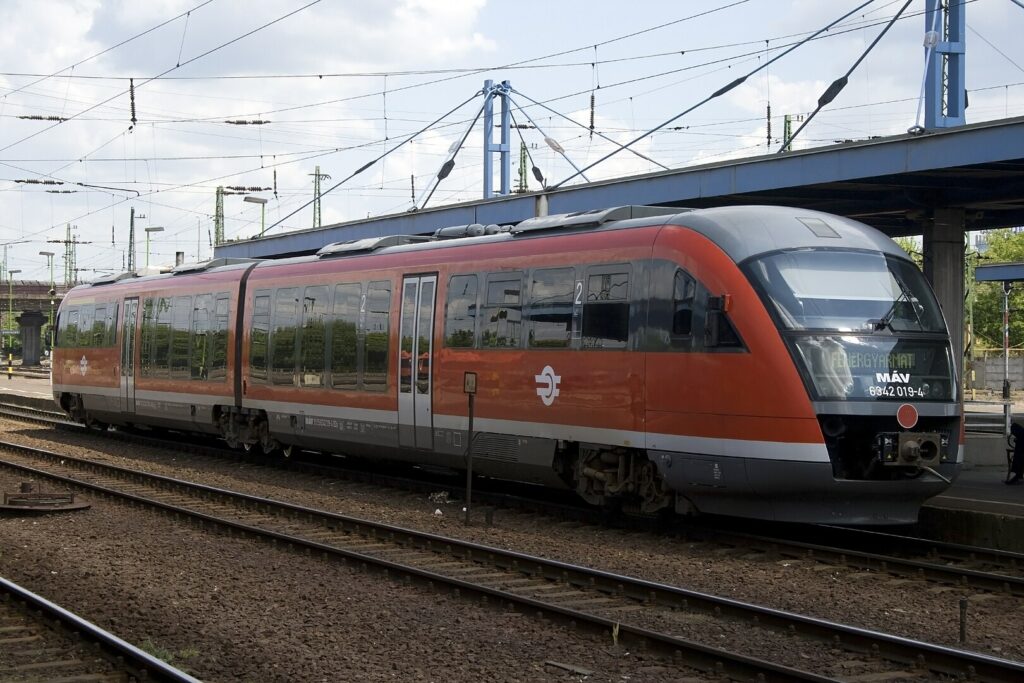The https://english.atlatszo.hu use cookies to track and profile customers such as action tags and pixel tracking on our website to assist our marketing. On our website we use technical, analytical, marketing and preference cookies. These are necessary for our site to work properly and to give us inforamation about how our site is used. See Cookies Policy
Hungarian Transport Ministry „no longer friends” with Siemens as train maitenance breaks down
János Lázár, Minister of Transport announced a railway renewal worth hundreds of billions of forints. However, new Siemens Desiro motor trains continue to rest in a garage. According to the national railway company, their refurbishment is stalled “due to disruptions in the supply of spare parts, which also affect Ausrtria”. Former transport state secretary Dávid Vitézy is harsher, saying that the maintenance at the state railway company has collapsed.
“Twenty percent more people travelled by rail this year than last year. And increasing the efficiency of rail freight transport is also a prerequisite for our competitiveness. It is therefore in our social and economic interest to develop rail transport in its entirety. That is why we are modernising the railway lines and purchasing new rolling stock as part of our 5-point action plan. In the upcoming budget debate, I also count on the support of my opposition colleagues, as proper rail transport is in the interest of the whole country” – János Lázár, Minister of Construction and Transport, recently posted on Facebook.

Renovation cancelled at a critical time
In the last few months, the Minister has repeatedly spoken about the grossly underfunded state railway company. In early September, he announced on his Facebook page that nearly HUF 850 billion would be spent on the railways. He said that the amount would be used to renew around 5,000 kilometres of track, restarting the production of domestic IC wagons, and to purchasing good quality second-hand trains.
In 2023 János Lázár canceled a planned locomotive replacement, which would have replaced 150 old locomotives with new Siemens models. At the time, he said, “the government no longer expects the German company Siemens to contribute to the renewal of the fleet (…) we are no longer friends with them.”
An antique train collection
MÁV was since forced to lease second-hand locomotives and toput 40-year-old Henschel diesel locomotives into service. People in the national railway company MÁV are now sarcastically comparing the company’s fleet to a deck of trading cards: every locomotive is different.
The problem is that maintaining such a colorful fleet is extremely dificult, especially a fleet with such old models.
One of the latest models MÁV uses are 13 Siemens Desiro passenger trains, that are already over 20 years old.
Although the introduction of Desiro has brought significant improvements to MÁV, last year, on the 20th anniversary of the Hungarian purchase of Desiros, iho.hu wrote that “after 20 years of operation, the Desiros with starter engines and passenger compartments could use a lot of modernisation, as they have frequent technical failures and the comfort should be improved. There is little hope for improvement in the current resource and manpower constrained environment.”
Now, almost two years later, we wanted to know how many of the trains in the fleet are in operation. More than two months ago, we sent a freedom of infromation request to MÁV asking about the Desiro vehicles.
MÁV replied that 12 of the 31 trains are not in service, which means that 38% of the fleet is not in operation.
According to MÁV, these vehicles are waiting for spare parts. However, the vehicle with the number 95551-426-001-2 has been stationary since 2018, and nine trains have been at rest for more than a year. All of them broke down under the Fidesz government, and their renovation is still pending under János Lázár, who is talking about a railway renovation worth hundreds of billions of forints.
Orders not being fulfilled
MÁV said of the repairs that “the Siemens Desiro multiple units meet MÁV-START’s expectations in every respect, and we are counting on them for the long term. The maintenance costs are in line with the age and technical condition of the vehicles and are no higher than for other vehicle types with similar parameters.”
Regarding the maintenance, it was reported that “MÁV-START has already signed a contract for the repair of the bogies in 2022, in which the Austrian railway company ÖBB TS, which repairs similar vehicles of Austrian railways, was involved as a subcontractor. This means that the necessary resources are available to operate the vehicles. The bogies of older vehicles are already being repaired by the Austrian company.
Under the contract, 18 bogies (wheel and gearbox) under the vehicles were due to be repaired, but only 4 of these have been repaired due to the supply and trade disruption of parts, which also affected the Austrians. Unfortunately, this is hampering the maintenance and repair of all types of vehicles”.
Dávid Vitézy, former State Secretary for Transport, wrote to Átlátszó that “the situation is similar for many types of vehicles at MÁV,
with the supply of spare parts and maintenance processes practically collapsing
as a result of the procurement authorisation and centralisation of procurement (MÁV SZK procures spare parts instead of Start) ordered by János Lázár, and the privatisation of the in-house main testing capability (Vagon). This also affects Desiros.”
He added: “In addition, the serviceability of the Desiros has been showing a deteriorating trend for many years, which is why we launched the bogie replacement programme in 2022, for which the MÁV Group has been contracted. I have no current information on the performance of the contract, but by now a significant part of the fleet should be in the bogie overhaul and engine replacement phase.”
Written by Csaba Segesvári, translated by Zalán Zubor. Hungarian version of this story can be found here. Cover photo: A Siemens Desiro in Debrecen in 2010 (photo: Wikipedia/Szilas)

